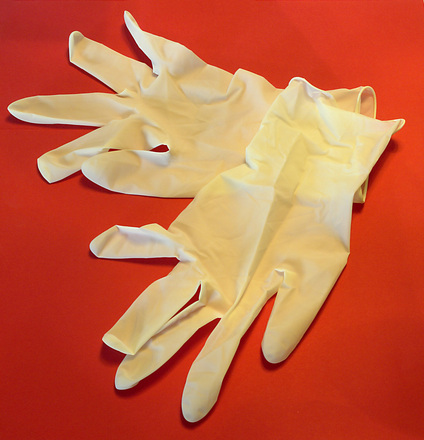Latex allergy affects about 3 million Americans—less than 1 percent of the population. In the health care industry, though, the percentage is significantly higher. Eight to 17 percent of health care workers have a latex allergy. As this statistic indicates, repeated exposure to latex (such as through latex gloves worn by medical professionals) dramatically increases your risk for a latex allergy.

(Freeimages / Antonio Jiménez Alonso)
Latex allergies are also common in people who have had multiple surgeries, work in the rubber industry, or who have a urinary catheter with a rubber tip. People with asthma or eczema also have a higher incidence of latex allergy than the general population.
A Link to Food Allergy
Due to a phenomenon known as cross-reactivity, there is a correlation between food allergies and latex allergies. This is because the proteins found in certain fresh produce items and nuts are very similar to those found in latex. Banana, avocado, chestnut, and kiwi allergies have the highest degree of association with latex allergies.
Symptoms
Latex—properly known as natural rubber latex—contains various proteins that can stir up allergies. The proteins are harmless, but allergies occur when the immune system misidentifies them as “enemies” and launches a histamine response to “fight” the proteins off. The result is a host of allergy symptoms including:
- Redness or swelling of skin that has come in contact with the latex
- Hives
- Hay fever
- Headache
- Itchy eyes
- Itchy or sore throat
- Stomach cramps
- Asthma
- Anaphylaxis (rare but can be life-threatening)
Latex is found in many products, including rubber gloves, balloons, condoms, bandages, pacifiers, orthodontic elastics, blood pressure cuffs, stethoscope tubing, and spandex.
Allergy Testing
If you show symptoms of a latex allergy, talk to your physician. Your doctor may be able to test you in-house or refer you to an allergist. Testing begins with an allergy test kit. A physician may use a blood test or skin scratch test kit to gauge your reaction to common allergens, including latex.
Dealing with Latex Allergies
If you are determined to be allergic to latex, you can take a number of measures to minimize your reactions. Here are some ideas:
- Choose latex-free alternatives such as vinyl or nitrile gloves. You can also check into guayule products. Guayule rubber comes from a desert bush instead of the usual rubber tree and does not contain the same allergy-causing proteins.
- If you have a mild reaction to latex, treat it with anti-inflammatory medications.
- If you are at risk for serious latex reactions, make sure to carry auto-injectable epinephrine to ward off an anaphylactic reaction.


